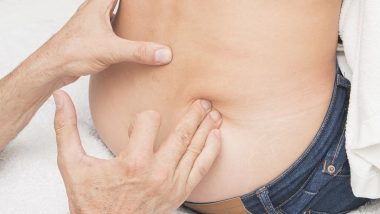Celine Dion is bringing attention to the stiff-person syndrome as she discusses the health issues that have caused her to postpone and cancel some of her shows. On Thursday, December 8, singer Celine Dion shared a video explaining her recent diagnosis of the rare illness. "We now know this is what’s been causing all of the spasms that I’ve been having," Dion, 54, said. Celine Dion Diagnosed With Stiff Person Syndrome, an Incurable Neurological Disorder; Watch Titanic Singer Make This Revelation in an Emotional Video.
"Unfortunately, these spasms affect every aspect of my daily life, sometimes causing difficulties when I walk and not allowing me to use my vocal cords to sing the way I’m used to. … I’m working hard with my sports medicine therapist every day to build back my strength and my ability to perform again, but I have to admit it’s been a struggle," she further said. To understand the rare condition that affects about 1 in a million people, let's analyse the meaning, symptoms, causes, and treatments.
What is Stiff-Person Syndrome (SPS)?
An uncommon neurological condition called stiff-person syndrome (SPS) causes growing muscle stiffness (rigidity) and recurrent, excruciating muscle spasms. Muscle rigidity typically occurs concurrently with muscle spasms and frequently fluctuates (i.e., gets worse before getting better). Spasms can happen at random or be brought on by a number of various things, such as a loud noise or a brief physical contact. Other neurological symptoms or indications are typically absent. Each person has a unique level of SPS severity and progression. If SPS is not treated, it may worsen and make it difficult to walk, which would greatly affect one's capacity to carry out regular, everyday duties. SPS is thought to be an autoimmune condition and occasionally co-occurs with other autoimmune disorders, despite the fact that its precise origin is unknown.
Signs of Stiff Person Syndrome
- Having trouble walking
- Tripping when standing or walking
- Crouching position
- Bouts of persistent muscular rigidity, especially in the trunk and limbs
- Muscular spasms that are excruciatingly painful and that can be induced by stimuli.
Who is More Prone Stiff Person Syndrome?
Two times as many women as males experience stiff person syndrome. In most cases, symptoms appear between the ages of 30 and 60. There is a strong correlation between stiff person syndrome and various autoimmune disorders, including:
- Diabetes
- Chronic anaemia
- Thyroiditis
- Vitiligo
How Exactly is Stiff Person Syndrome Identified?
The following tests are likely to be used by your doctor to identify stiff person syndrome, in addition to a clinical evaluation and a thorough medical history:
- GAD antibody screening using blood tests
- Using electromyography, one can capture the electrical activity of contracting and relaxed muscles.
Stiff Person Syndrome Treatments
Muscle rigidity and spasms might worsen without treatment, making it difficult to walk and carry out other daily chores. Drugs like benzodiazepines, which are GABA receptor agonists, can be used to treat episodic spasms and muscle stiffness. Benzodiazepines and the muscle relaxant baclofen may be prescribed together.
Conservative treatments like stretching, heat therapy, water therapy, massage therapy, and acupuncture may also be effective for treating stiff person syndrome.
Although additional research is required, studies have revealed that intravenous immunoglobulin may also be a successful treatment for stiff person syndrome.
In the medical literature, the stiff-person syndrome has been referred to by a variety of perplexing titles. The illness was first called stiff-man syndrome, but the name was modified to reflect that it can affect people of any age and gender. In actuality, women are more likely than men to have the illness. Many researchers believe that stiff-person syndrome is a spectrum disease that can affect any part of the body, from just one area to the entire body and even the brain stem and spinal cord in some cases.
(This article is written for an informative purpose and should not be substituted for medical advice. Kindly consult your doctor before trying any tips.)
(The above story first appeared on LatestLY on Dec 09, 2022 08:56 AM IST. For more news and updates on politics, world, sports, entertainment and lifestyle, log on to our website latestly.com).













 Quickly
Quickly





















